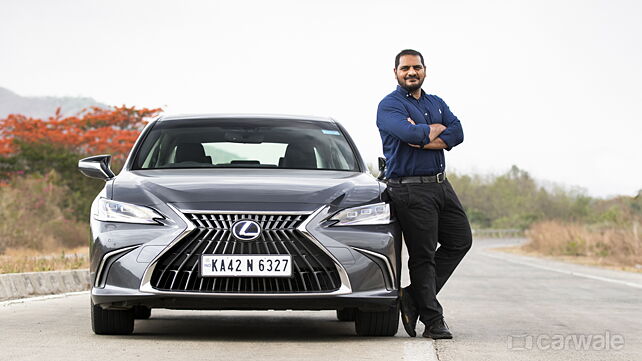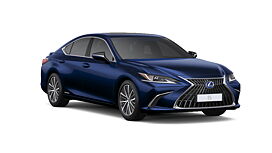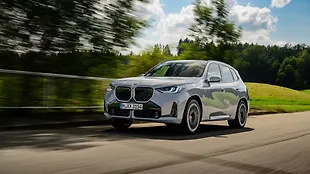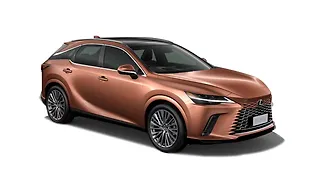Why would I buy it?
- Attractive styling still grabs attention
- Fuel-efficient hybrid powertrain
- Relaxed and comfortable runabout
Why would I avoid it?
- Update brings no significant changes
- Not a driver’s car
- Limited sales and service network
Summary

Gatecrashing the German trio’s (the 5, E, and A6) party, this – new for 2022 – Lexus ES offers luxury car buyers something that the other three don’t, that is, a distinctive hybrid powertrain, an eye-catching design, and luxury that’s focused on comfort and longevity rather than outright flamboyance. It might not be as dynamically sound as the 5 Series, or offer the opulence of the E-Class but the ES can turn heads whether it’s on the red carpet or a corporate car park.
Engine and Performance
8.5 / 10

What makes the ES special amongst its peers is its hybrid powertrain – the 2.5-litre four-cylinder petrol engine is paired to an electric motor. While the petrol engine produces 176bhp and 221Nm, the electric motor on its own has an output of 88kW (around 118bhp) and 202Nm. Although the total system output might be no match to what you get from, say 530i, the ES300h makes a strong case for itself with the range-extended hybrid powertrain. When started and under low load conditions, the ICE engine remains dormant. Then, the switch between the ICE and electric motor is a complex mechanism but it's nearly indistinguishable for the driver when powered by the electric motor and when the engine is cranked up and running.

At city speeds, the ES’ pure EV mode is enough to cruise through the city traffic as there’s immediate response off the line. And even when in motion, there’s no delay in power delivery. When the petrol engine kicks in, the power delivery remains seamless and direct. As expected, the four-cylinder engine is refined and has a good amount of bottom and mid-range grunt. Now, as long as there’s sufficient charge in the battery, the ES would run on pure EV mode. But if there’s not enough juice, the ES won’t shift to electric mode and would deploy the ICE engine to drive as well as charge the battery.

With its laid-back character, when the ES300h is pushed it does rake up speed in a leisured manner and won’t pin you back in your seats while propelling towards triple-digit speeds. It will get there in unhurried progress and devoid of any unnecessary drama. At highway speeds, there’s good composure when both engine and battery feed power to the wheels. So overtaking in this five-meter saloon is easier than expected.

The e-CVT transmission also works quite skillfully. When driven sedately, the rubber band effect in the automatic is fairly absent. And if the relaxed nature of the gearbox leaves you wanting for more, there are paddle shifters behind the wheel to take care of it. Because, when floored, the gearbox somewhat feels slouch as it’s focused more on comfort rather than thrilling speeds.
Ride and Handling
8 / 10

Instead of being an outright sporty three-box sedan, the ES is focused on cocooning the passengers. Considering our battered road conditions, the ES glides over most of the irregularities without transferring any judders inside the cabin. Sitting on 235/45 18-inch wheels wrapped in Bridgestone tyres, the ES deals with undulating road surfaces with a relaxed, comfortable demeanour at city speeds. Despite being softly sprung, the vertical motions are kept well in check and even at highway speeds, the undulations are taken in with supple composure. Since it’s a low-slung car, the large and abrupt speed breakers need to be taken with caution and we’d surely avoid pothole-infested patches of the road in the ES.

Show it some corners and the ES doesn’t disappoint either. It might not point in the direction with a tidy line like the 5 Series would. But with good heft to the steering and enough grip from the tyres, the ES feels quite planted. Then, the steering remains consistent and progressive, especially in the Sport mode and there’s good feedback from it as well – although it doesn’t have that mechanical connection to it. Carry too much speed and the hefty weight and sheer length of the ES make themselves apparent. Thankfully, there’s enough electronic support to keep you from understeering and preventing you from a rather expensive repair bill.
Comfort, Convenience, and Features
9 / 10

Step inside the ES and despite the update, not much has changed except the addition of a few much-needed features. The biggest change here is the 12.3-inch touchscreen which is larger than the older non-touch screen. As for the cabin feel, the ES – in a typical Lexus fashion – has a busy but classy-looking interior which feels like it’s built to last. The quality of the materials used all around is top-notch and even the leather inserts on the dashboard and door pads feel much more premium, even if they don’t appear to be.
Now, it’s not a handsome-looking cabin, it's busy with buttons and knobs with controls all thrown around. But we reckon it to age gracefully. On the flip side, you might find that some elements inside the cabin have started to look dated, while some buttons and stalks are shared from Toyota’s part bin, making them a tad less special.

As for the seats, they are large and supportive and offer heating and cooling functions. Even the visibility outside is good for such a low-slung and long car. Move to the back seat, where most of the owners will be spending their time, and there’s more than ample leg room on offer. The headroom might be tight for tall passengers though. The seats also offer great support and comfort, preventing any tiredness even after spending long hours.

There’s also a backrest adjustment for the second row, which might not be used as often as Lexus would have thought. Apart from that, the rear passengers also get heated seats and a separate control panel tucked in the folding armrest which gets buttons for aircon, multimedia, and sun blinds – quite authoritarian!

Coming back to the touchscreen, the user interface looks outdated with its hard-to-read layout, lack of colours, and difficulty in navigating through menus and control functions. It gets the trackpad though, which isn’t very intuitive to use if you aren’t used to it. This trackpad is a unique feature, but competition has moved on to gesture control and it feels like aeons back in time. And it’s also difficult to operate with the left hand on the move when you are a righty.

Being an executive sedan (it says right in its name), there’s a long feature list which includes a sunroof, three-zone climate control, electric boot lid, powered seat with memory function and electric steering wheel adjust, wireless charger, heads-up display, rear parking camera, and ambient lighting. Lest we forget, there’s also a brilliant sounding 17-speaker Mark Levinson music system. As for safety, there are 10 airbags, ABS with EBD, ISOFIX, TPMS and stability control.
Conclusion
8.5 / 10

The Lexus ES is a comfort-oriented luxury saloon that’s not masked as a sporty sedan. Amidst the Black Widow, Scarlet Witch, or Captain Marvel, the ES is more of a Jane Foster – smart and intelligent, beautiful enough to win a heart of a god, and worthy of wielding the Mjolnir. Moreover, the ES has a hybrid powertrain (that none of its rivals offer) making it a sensible buy given it would be more efficient when sitting in traffic. Not to mention, there’s a comfortable cabin that will easily stand the test of time. And it’s not shy of a long features list either.

Sure, it might not be an exciting car for those who find themselves behind the wheel more often. And compared to the rivals, the sales and service network would leave you in the doldrums. But the Lexus ES350h is worth the ‘investment’ for those who not only want a clever piece of engineering but also jaw-droppingly good looks from all angles, all the while compensating through this prudent package for its lack of market appeal.

Pictures by Kaustubh Gandhi



































